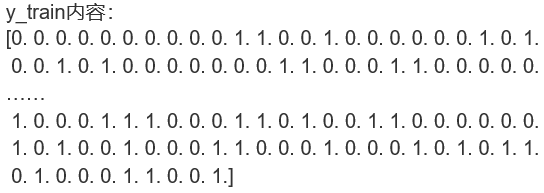ML之Xgboost:利用Xgboost模型(7f-CrVa+网格搜索调参)对数据集(比马印第安人糖尿病)进行二分类预测
ML之Xgboost:利用Xgboost模型(7f-CrVa+网格搜索调参)对数据集(比马印第安人糖尿病)进行二分类预测
目录
输出结果



![]()

设计思路

核心代码
- grid_search = GridSearchCV(model, param_grid, scoring="neg_log_loss", n_jobs=-1, cv=kfold)
- grid_result = grid_search.fit(X, Y)
-
-
- param_grid = dict(learning_rate=learning_rate)
- kfold = StratifiedKFold(n_splits=10, shuffle=True, random_state=7)
- class GridSearchCV(-title class_ inherited__">BaseSearchCV):
- """Exhaustive search over specified parameter values for an estimator.
-
- Important members are fit, predict.
-
- GridSearchCV implements a "fit" and a "score" method.
- It also implements "predict", "predict_proba", "decision_function",
- "transform" and "inverse_transform" if they are implemented in the
- estimator used.
-
- The parameters of the estimator used to apply these methods are
- optimized
- by cross-validated grid-search over a parameter grid.
-
- Read more in the :ref:`User Guide <grid_search>`.
-
- Parameters
- ----------
- estimator : estimator object.
- This is assumed to implement the scikit-learn estimator interface.
- Either estimator needs to provide a ``score`` function,
- or ``scoring`` must be passed.
-
- param_grid : dict or list of dictionaries
- Dictionary with parameters names (string) as keys and lists of
- parameter settings to try as values, or a list of such
- dictionaries, in which case the grids spanned by each dictionary
- in the list are explored. This enables searching over any sequence
- of parameter settings.
-
- scoring : string, callable, list/tuple, dict or None, default: None
- A single string (see :ref:`scoring_parameter`) or a callable
- (see :ref:`scoring`) to evaluate the predictions on the test set.
-
- For evaluating multiple metrics, either give a list of (unique) strings
- or a dict with names as keys and callables as values.
-
- NOTE that when using custom scorers, each scorer should return a
- single
- value. Metric functions returning a list/array of values can be wrapped
- into multiple scorers that return one value each.
-
- See :ref:`multimetric_grid_search` for an example.
-
- If None, the estimator's default scorer (if available) is used.
-
- fit_params : dict, optional
- Parameters to pass to the fit method.
-
- .. deprecated:: 0.19
- ``fit_params`` as a constructor argument was deprecated in version
- 0.19 and will be removed in version 0.21. Pass fit parameters to
- the ``fit`` method instead.
-
- n_jobs : int, default=1
- Number of jobs to run in parallel.
-
- pre_dispatch : int, or string, optional
- Controls the number of jobs that get dispatched during parallel
- execution. Reducing this number can be useful to avoid an
- explosion of memory consumption when more jobs get dispatched
- than CPUs can process. This parameter can be:
-
- - None, in which case all the jobs are immediately
- created and spawned. Use this for lightweight and
- fast-running jobs, to avoid delays due to on-demand
- spawning of the jobs
-
- - An int, giving the exact number of total jobs that are
- spawned
-
- - A string, giving an expression as a function of n_jobs,
- as in '2*n_jobs'
-
- iid : boolean, default=True
- If True, the data is assumed to be identically distributed across
- the folds, and the loss minimized is the total loss per sample,
- and not the mean loss across the folds.
-
- cv : int, cross-validation generator or an iterable, optional
- Determines the cross-validation splitting strategy.
- Possible inputs for cv are:
- - None, to use the default 3-fold cross validation,
- - integer, to specify the number of folds in a `(Stratified)KFold`,
- - An object to be used as a cross-validation generator.
- - An iterable yielding train, test splits.
-
- For integer/None inputs, if the estimator is a classifier and ``y`` is
- either binary or multiclass, :class:`StratifiedKFold` is used. In all
- other cases, :class:`KFold` is used.
-
- Refer :ref:`User Guide <cross_validation>` for the various
- cross-validation strategies that can be used here.
-
- refit : boolean, or string, default=True
- Refit an estimator using the best found parameters on the whole
- dataset.
-
- For multiple metric evaluation, this needs to be a string denoting the
- scorer is used to find the best parameters for refitting the estimator
- at the end.
-
- The refitted estimator is made available at the ``best_estimator_``
- attribute and permits using ``predict`` directly on this
- ``GridSearchCV`` instance.
-
- Also for multiple metric evaluation, the attributes ``best_index_``,
- ``best_score_`` and ``best_parameters_`` will only be available if
- ``refit`` is set and all of them will be determined w.r.t this specific
- scorer.
-
- See ``scoring`` parameter to know more about multiple metric
- evaluation.
-
- verbose : integer
- Controls the verbosity: the higher, the more messages.
-
- error_score : 'raise' (default) or numeric
- Value to assign to the score if an error occurs in estimator fitting.
- If set to 'raise', the error is raised. If a numeric value is given,
- FitFailedWarning is raised. This parameter does not affect the refit
- step, which will always raise the error.
-
- return_train_score : boolean, optional
- If ``False``, the ``cv_results_`` attribute will not include training
- scores.
-
- Current default is ``'warn'``, which behaves as ``True`` in addition
- to raising a warning when a training score is looked up.
- That default will be changed to ``False`` in 0.21.
- Computing training scores is used to get insights on how different
- parameter settings impact the overfitting/underfitting trade-off.
- However computing the scores on the training set can be
- computationally
- expensive and is not strictly required to select the parameters that
- yield the best generalization performance.
-
-
- Examples
- --------
- >>> from sklearn import svm, datasets
- >>> from sklearn.model_selection import GridSearchCV
- >>> iris = datasets.load_iris()
- >>> parameters = {'kernel':('linear', 'rbf'), 'C':[1, 10]}
- >>> svc = svm.SVC()
- >>> clf = GridSearchCV(svc, parameters)
- >>> clf.fit(iris.data, iris.target)
- ... doctest: +NORMALIZE_WHITESPACE +ELLIPSIS
- GridSearchCV(cv=None, error_score=...,
- estimator=SVC(C=1.0, cache_size=..., class_weight=..., coef0=...,
- decision_function_shape='ovr', degree=..., gamma=...,
- kernel='rbf', max_iter=-1, probability=False,
- random_state=None, shrinking=True, tol=...,
- verbose=False),
- fit_params=None, iid=..., n_jobs=1,
- param_grid=..., pre_dispatch=..., refit=..., return_train_score=...,
- scoring=..., verbose=...)
- >>> sorted(clf.cv_results_.keys())
- ... doctest: +NORMALIZE_WHITESPACE +ELLIPSIS
- ['mean_fit_time', 'mean_score_time', 'mean_test_score',...
- 'mean_train_score', 'param_C', 'param_kernel', 'params',...
- 'rank_test_score', 'split0_test_score',...
- 'split0_train_score', 'split1_test_score', 'split1_train_score',...
- 'split2_test_score', 'split2_train_score',...
- 'std_fit_time', 'std_score_time', 'std_test_score', 'std_train_score'...]
-
- Attributes
- ----------
- cv_results_ : dict of numpy (masked) ndarrays
- A dict with keys as column headers and values as columns, that can be
- imported into a pandas ``DataFrame``.
-
- For instance the below given table
-
- +------------+-----------+------------+-----------------+---+---------+
- |param_kernel|param_gamma|param_degree|split0_test_score|...
- |rank_t...|
-
- +============+===========+============+========
- =========+===+=========+
- | 'poly' | -- | 2 | 0.8 |...| 2 |
- +------------+-----------+------------+-----------------+---+---------+
- | 'poly' | -- | 3 | 0.7 |...| 4 |
- +------------+-----------+------------+-----------------+---+---------+
- | 'rbf' | 0.1 | -- | 0.8 |...| 3 |
- +------------+-----------+------------+-----------------+---+---------+
- | 'rbf' | 0.2 | -- | 0.9 |...| 1 |
- +------------+-----------+------------+-----------------+---+---------+
-
- will be represented by a ``cv_results_`` dict of::
-
- {
- 'param_kernel': masked_array(data = ['poly', 'poly', 'rbf', 'rbf'],
- mask = [False False False False]...)
- 'param_gamma': masked_array(data = [-- -- 0.1 0.2],
- mask = [ True True False False]...),
- 'param_degree': masked_array(data = [2.0 3.0 -- --],
- mask = [False False True True]...),
- 'split0_test_score' : [0.8, 0.7, 0.8, 0.9],
- 'split1_test_score' : [0.82, 0.5, 0.7, 0.78],
- 'mean_test_score' : [0.81, 0.60, 0.75, 0.82],
- 'std_test_score' : [0.02, 0.01, 0.03, 0.03],
- 'rank_test_score' : [2, 4, 3, 1],
- 'split0_train_score' : [0.8, 0.9, 0.7],
- 'split1_train_score' : [0.82, 0.5, 0.7],
- 'mean_train_score' : [0.81, 0.7, 0.7],
- 'std_train_score' : [0.03, 0.03, 0.04],
- 'mean_fit_time' : [0.73, 0.63, 0.43, 0.49],
- 'std_fit_time' : [0.01, 0.02, 0.01, 0.01],
- 'mean_score_time' : [0.007, 0.06, 0.04, 0.04],
- 'std_score_time' : [0.001, 0.002, 0.003, 0.005],
- 'params' : [{'kernel': 'poly', 'degree': 2}, ...],
- }
-
- NOTE
-
- The key ``'params'`` is used to store a list of parameter
- settings dicts for all the parameter candidates.
-
- The ``mean_fit_time``, ``std_fit_time``, ``mean_score_time`` and
- ``std_score_time`` are all in seconds.
-
- For multi-metric evaluation, the scores for all the scorers are
- available in the ``cv_results_`` dict at the keys ending with that
- scorer's name (``'_<scorer_name>'``) instead of ``'_score'`` shown
- above. ('split0_test_precision', 'mean_train_precision' etc.)
-
- best_estimator_ : estimator or dict
- Estimator that was chosen by the search, i.e. estimator
- which gave highest score (or smallest loss if specified)
- on the left out data. Not available if ``refit=False``.
-
- See ``refit`` parameter for more information on allowed values.
-
- best_score_ : float
- Mean cross-validated score of the best_estimator
-
- For multi-metric evaluation, this is present only if ``refit`` is
- specified.
-
- best_params_ : dict
- Parameter setting that gave the best results on the hold out data.
-
- For multi-metric evaluation, this is present only if ``refit`` is
- specified.
-
网站声明:如果转载,请联系本站管理员。否则一切后果自行承担。
赞同 0
评论 0 条
- 上周热门
- 如何使用 StarRocks 管理和优化数据湖中的数据? 2951
- 【软件正版化】软件正版化工作要点 2872
- 统信UOS试玩黑神话:悟空 2833
- 信刻光盘安全隔离与信息交换系统 2728
- 镜舟科技与中启乘数科技达成战略合作,共筑数据服务新生态 1261
- grub引导程序无法找到指定设备和分区 1226
- 华为全联接大会2024丨软通动力分论坛精彩议程抢先看! 165
- 2024海洋能源产业融合发展论坛暨博览会同期活动-海洋能源与数字化智能化论坛成功举办 163
- 点击报名 | 京东2025校招进校行程预告 163
- 华为纯血鸿蒙正式版9月底见!但Mate 70的内情还得接着挖... 159
- 本周热议
- 我的信创开放社区兼职赚钱历程 40
- 今天你签到了吗? 27
- 如何玩转信创开放社区—从小白进阶到专家 15
- 信创开放社区邀请他人注册的具体步骤如下 15
- 方德桌面操作系统 14
- 用抖音玩法闯信创开放社区——用平台宣传企业产品服务 13
- 我有15积分有什么用? 13
- 如何让你先人一步获得悬赏问题信息?(创作者必看) 12
- 2024中国信创产业发展大会暨中国信息科技创新与应用博览会 9
- 中央国家机关政府采购中心:应当将CPU、操作系统符合安全可靠测评要求纳入采购需求 8
热门标签更多

